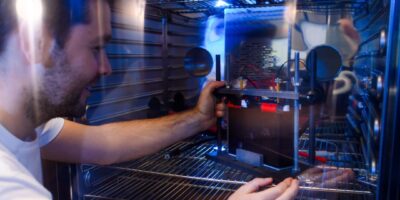

Top articles in November on eeNews Europe
The biggest news for November on eeNews Europe was ARM joining the Rust Foundation. The newish programming language has had its struggles to hit the mainstream with maintainers falling out, but the public support by a major chip technology supplier has boosted the awareness of developers.
- ARM joins Rust Foundation
- ARM details virtual models for the IoT
- Boosting IoT rollout with virtual hardware
Alongside the support for Rust, ARM has also been pushing its development tools into the wider developer ecosystem in the Internet of Things, encouraging them to use virtual models as part of the continuous integration/continuous development (CI/CD) process. These have been used for many years by chip designers, but Amazon is now offering certain ARM processor and AI accelerator virtual models as instances on its cloud. We looked at the details of how this was achieved and the prospects for the ‘app store’ approach for IoT software.
November also saw the first stages of the dismantling of Toshiba after decades in the electronics industry. The struggling Japanese giant will be split into three, separating out the shares in the Kioxia memory business from the electronic devices and equipment businesses which will both be renamed.
The chip shortage that brought the automotive industry to is knees is having a longer term impact. Car makers are realising the importance of semiconductors for their business as the number of chips in vehicles increases, and are taking measures to protect the supply chain. This is seeing the car brands move back to a more vertically integrated model, and the Ford deal with GlobalFoundries is the first example of this move.
This is just the start of the move, says Ford, so the acquisition of a global chip design house is on the cards.
Covid-19 has also taken its toll on exhibitions, with broadcast technology show IBC cancelling its in-person exhibition in Amsterdam at short notice.
But there have been some winners from the chip shortages, with distribution in Germany showing the benefits.
At the same time, European test giant Rohde & Schwarz is re-structuring its business, although it points out the lower revenues are a result of the impact of Covid-19 on the industry in the last year.
Raspberry Pi is moving forwards, having raised $45m recently and planning for an IPO share sale, according to reports. It has also been moving forwards in technology, with its first co-packaged part combining its silicon and memory to reduce the cost and power consumption of its latest board.
Quantum computing is a key technology for the future of the industry, and the UK government’s deal with the US to enable a level playing field was an important announcement in November.
Related articles
- Top articles in October
- 头条新闻9月
- Top news in August
- Top news in July
- Top news in June
- Top news in May
- Top news in April
- Top news in March
- Top news in February
Other articles on eeNews Europe
- Fabless winners in 2021 boom time
- World’s smallest MEMS gyroscope for navigation
- Consolidation shrinks IoT platform players
- CEO Interview: Jim Witham, GaN Systems
- Samsung choses Austin for $17bn 3nm fab
- UK to ban default passwords in smart home devices
- Foxconn buys into V2X expert Autotalks






